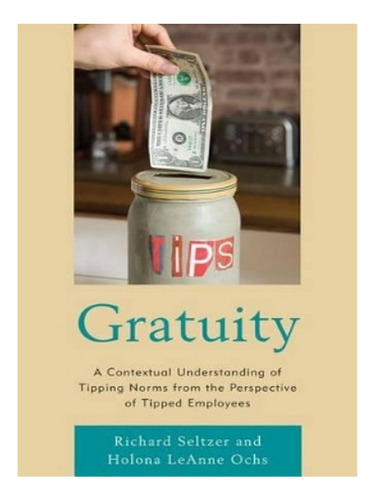Gratuity - Richard Seltzer, Holona Leanne Ochs. Eb19
en 6 cuotas de
Precio sin impuestos nacionales:
Solo en CABA y zonas de GBA
Comprando dentro de las próximas 5 h 42 min
Las fechas de entrega incluyen los 45 días necesarios para tener listo el producto.
+100 ventas
Vendido por ESMERALDA BOOKS
+250mil Productos
+100
Ventas concretadas
No brinda buena atención
Despacha sus productos con demora
Medios de pago
Cuotas sin Tarjeta
Tarjetas de crédito
Tarjetas de débito
Efectivo



Características del producto
Características principales
Autor | Richard Seltzer, Holona LeAnne Ochs |
|---|---|
Idioma | Inglés |
Editorial del libro | Lexington Books |
Tapa del libro | Blanda |
Descripción
Somos una librería que se dedica a traer libros importados, trabajamos con los principales proveedores internacionales y editoriales, siendo nuestros libros originales y asegurando la calidad del mismo.
Una vez realizada la compra el proveedor envía el libro a nuestro deposito para su despacho, una vez despachado se envían los datos para su seguimiento.
Brindamos garantía sobre nuestros libros y MercadoLibre asegura su dinero hasta que reciba el libro de conformidad.
EL COSTO DE ENVIO ES GRATIS. SE REALIZAN ENVIOS A TODO EL PAIS.
El plazo de entrega del libro hasta su puerta es de 29 días aproximadamente.
Contamos con gran catalogo de libros, si no lo tenemos publicado lo conseguimos.
Cualquier duda o consulta estamos a su disposición.
ESMERALDA BOOKS.
Descripción: A Contextual Understanding of Tipping Norms from the Perspective of Tipped Employees. Gratuity is based on interviews with 425 people in more than 50 occupational categories. The respondents from across the U.S. reflect the diversity of the population but have one thing in common: they earn tips. A tip is a price set almost entirely by a customer, less connected to demand than to social code. In the U.S., tipping remains one of our most controversial, confusing, and highly variable norms. In their own words, respondents present their perspectives regarding their compensation as well as what they like and dislike about work. Understanding what people think about tipping and how tipped employees experience their work provides an understanding of tipping norms that has never been addressed. The evidence in this study indicates that tips do not appear to increase in accordance with inequality, and tips do not alleviate the discomfort of inequality from the perspective of the tipped employee when they are given to demonstrate status over another. Tips may in some cases serve a redistributive function, but they are not consistent with regard to social status. The evidence in this study also indicates that tips are a weak signal of quality and are not likely to serve as an effective monitoring mechanism. People appear to conform to tipping norms for social and emotional rather than strictly rational reasons. Furthermore, conformity to tipping norms is likewise inconsistent across work contexts. One of the principal mechanisms for fostering conformity lies within the organizational hierarchy, and management plays a critical role. The definitive difference between those who like their job and those who do not is the experience with people, particularly management. Every person who interacts with the public encounters people who are rude or disrespectful. The critical lesson for management is that the emotional costs of these interactions can be mitigated by managers who extend trust and support to employees. The absence of trust in the workplace contributes to a work environment that imposes additional, unnecessary costs on employees and likely affects the experiences of customers.
Preguntas y respuestas
¿Qué querés saber?
Preguntale al vendedor
Nadie hizo preguntas todavía.
¡Hacé la primera!
